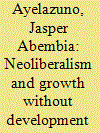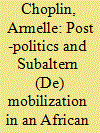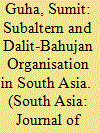| Srl | Item |
| 1 |
ID:
129095


|
|
|
|
|
| Publication |
2014.
|
| Summary/Abstract |
Ghana witnessed decent economic growth in the last three decades of implementing neoliberal policy prescriptions. Indeed, this growth promoted it to a low middle income country in 2010. Paradoxically, the wellbeing of most Ghanaians in the subaltern classes has not improved significantly, and they still suffer grinding poverty. How to understand this paradox of growth without development? This paper argues that the failure of Ghana to diversify its economy into industrialization, particularly manufacturing, explains the paradox. With its relatively good politics and open economy, the Ghanaian state should spearhead industrialization, as South Korea and Malaysia did, by supporting selective manufacturing firms with capital, technology, and protective tariffs.
|
|
|
|
|
|
|
|
|
|
|
|
|
|
|
|
| 2 |
ID:
147325


|
|
|
|
|
| Summary/Abstract |
Whereas some scholars have shown that urban contexts are the best place for mobilization, some others have argued that the contemporary complex governance transforms the city into a “post-political” space. Focusing on urban residents’ reactions to slum clearance in Nouakchott, the capital city of Mauritania, this paper seeks to explore these two opposite theses about politics in the Southern urban contexts – the quiet encroachment paradigm versus the post-political thought. Both dynamics are useful and complementary according to the scale of analysis: depoliticization on the level of urban governance and politicization on the level of popular politics.
|
|
|
|
|
|
|
|
|
|
|
|
|
|
|
|
| 3 |
ID:
188185


|
|
|
|
|
| Summary/Abstract |
This article analyses the history of Marathi-speaking India after 1600 in order to understand why Dalit and Bahujan movements first arose in this region before spreading across South Asia. It argues that this was an explicable consequence of a tradition of social action long extant at the village and supra-village levels—that self-organisation had been yoked to hegemonic power, but not thereby erased. I then invoke Antonio Gramsci’s concept of subalterns as subordinated fractions of a larger whole to analyse this phenomenon. Finally, I trace the breaks and continuities that enabled the leadership of Jyotirao Phule and B.R. Ambedkar.
|
|
|
|
|
|
|
|
|
|
|
|
|
|
|
|